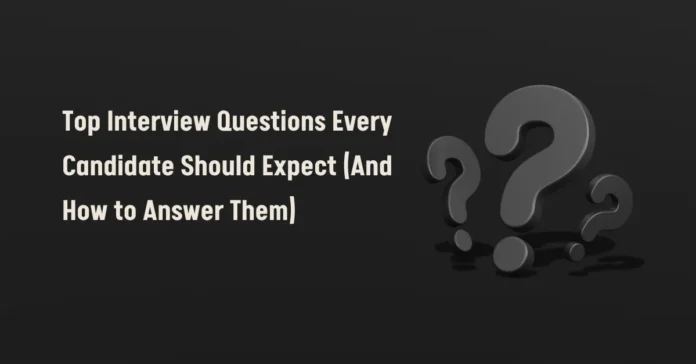Preparing for an interview can be nerve-wracking, but knowing what to expect can help you build confidence and make a strong impression. Below are some of the most common interview questions and tips on how to answer them effectively
1. Tell me about yourself
How to answer:
This is often the first question in an interview, and it’s a chance for you to introduce yourself and highlight your experience. Keep your answer brief and focused on your professional background. Focus on key achievements and experiences that align with the position you’re applying for.
Example:
“I am a project manager with over five years of experience working in the tech industry. In my last role at [Company], I successfully led a team of five on a high-impact project that increased operational efficiency by 30%. I’m excited to bring my expertise in team leadership and process improvement to this role.”
2. Why do you want to work here?
How to answer:
Research the company before your interview! Show that you understand the company’s mission, values, and culture. Align your response with how your goals and values fit with the company’s.
Example:
“I admire the company’s commitment to innovation and sustainability, which aligns with my personal values. I’m excited about the opportunity to contribute to a team that values creativity and impact, and I believe my background in [relevant skill] would be an asset.”
3. What are your strengths and weaknesses?
How to answer:
When talking about strengths, pick skills that are relevant to the job. Be honest about your weaknesses but follow up with how you’re working to improve them.
Example (Strength):
“One of my strengths is my ability to communicate complex ideas in simple terms, which helps in team collaboration and client presentations.”
Example (Weakness):
“A weakness I’ve worked on is my tendency to take on too much at once. I’ve been using project management tools to better prioritize tasks and set realistic deadlines, which has greatly improved my time management.”
4. Tell me about a time you faced a challenge at work and how you dealt with it.
How to answer:
Use the STAR method (Situation, Task, Action, Result) to structure your response. This ensures you give a clear, concise answer that highlights your problem-solving abilities.
Example:
“In my previous role, we had a tight deadline to launch a new product, but a key team member unexpectedly left. I took the initiative to reassign tasks, coordinated with other departments, and we successfully launched the product on time with no issues.”
5. Where do you see yourself in five years?
How to answer:
This question tests your ambition and whether your career goals align with the company’s potential growth. Be sure to show that you have long-term interest in the field, and tie your future growth to the company’s success.
Example:
“In five years, I see myself in a senior leadership role, continuing to learn and grow in [industry]. I’m excited about the opportunities this company offers for career development, and I look forward to taking on more responsibility as I contribute to the team’s success.”
6. Why did you leave your last job?
How to answer:
Be honest but keep it professional. Avoid speaking negatively about your previous employer. Focus on the positive reasons why you’re seeking new opportunities.
Example:
“I learned a lot in my previous role, but I’m looking for new challenges that allow me to grow and develop further. I’m excited about the opportunity to contribute my skills in a fresh environment where I can continue to evolve as a professional.”
7. Do you have any questions for us?
How to answer:
Always have a few thoughtful questions prepared. This shows interest in the company and the role. Ask about company culture, growth opportunities, or next steps in the hiring process.
Example:
“Can you tell me more about the team I’d be working with and how the company fosters professional development?”
Final Tips:
- Practice makes perfect: Rehearse answers but don’t memorize them. Stay natural and conversational.
- Be confident but humble: Showcase your skills, but don’t come off as arrogant.
- Follow-up: After the interview, send a personalized thank-you note to express appreciation for the opportunity.
#InterviewTips #JobInterview #CareerAdvice #InterviewPreparation #JobSearch #CareerDevelopment #JobInterviewTips #InterviewSuccess #ProfessionalGrowth

